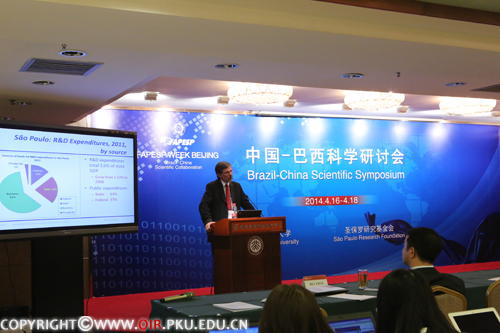Brazil-China Scientific Symposium, sponsored by the São Paulo Research Foundation (FAPESP) together with Peking University (PKU), was successfully held at Ying Jie Exchange Center of PKU from 16th to 18th April.The symposium’s main focus is to expand the relationship between researchers from the state of São Paulo and researchers from several academic and research institutions in China, for the purpose of promoting joint studies that could benefit the people of both countries.

The symposium brought outstanding researchers from both countries together who are from Peking University, Tsinghua University, Fudan University, Chia Agricultural University, Chinese University of Hong Kong, Chnese Academy of Agricultural Sciences, University of Sao Paulo, Sao Paulo State University and University of Campinas.

The symposium is consists of several parallel sessions with the topics of nanotechnology, environment , new energy, agriculture and life sciences, in which researchers from both countries take turns to deliver their speeches and participate in discussions. During the three-day symposium, in-depth communication was carried out among researchers from both countries.
On the opening ceremony of 16th April, Prof. Wang Enge, President of Peking University, said that he strongly believed in the bright prospect of scientific research and cooperation between the two countries in the future. Celso Lafer, President of FAPESP, said in his speech that scientific research holds a pivotal position in the development of government and even in the advancement of the society. Besides, Valdemar Carneiro Leão, Brazilian Ambassador to China, noted that it’s really a great idea to carry forward research and cooperation among academic and research institutions between the two countries, especially to conduct joint researches which may yield fruitful results. Fang Jun, Deputy Director General from the Ministry of Education of PRC, mentioned in his speech that this symposium provides more stable and effective channels for exchanges and cooperation.

Then academician Chen Shiyi, Vice President of PKU, and Carlos Henrique de Brito Cruz, FAPESP ScientificDirector, gave introductions about the status quo of scientific research in PKU and in Brazil respectively.
In parallel sessions, researchers from China and Brazil delivered fabulous keynote speeches and exhibited research findings in their respective fields, in which Professor Tao Shu from the College of Urban and Environmental Sciences, Peking University, Professor Liu Zhongfan from the Center for Nanoscale Science & Technology, Peking University, Peng Lianmao, Director of Key Laboratory for the Physics and Chemistry of Nanodevices, Peking University, and Wei Fei ,Director of Key Laboratory of Beijing Green Chemical Reaction Engineering and Technology and Professor of Department of Chemical Engineering, Tsinghua University, delivered wonderful speeches. In the session of agriculture and life sciences, Professor Paulo Araújo, who is from University of Sao Paulo, expressed impressive idea on agricultural economy for the audience.

Professor Paulo Nobre from Center for Weather and Climate Studies of National Institute For Space Research, concentrated on greenhouse effect in his remarks that although people are fully aware of the basic principles to solve the problem and have attached great importance to it, we have to change our mind and to link the ecosystem with the data collected from the development of human society so as to effectivly solve the problem.

Brazil-China Scientific Symposium is the first time FAPESP chose to hold such an event in China. When Celso Lafer received an interview from a student journalist form the Student Press Corps of PKU, he extended gratitude for PKU’s support for the event and expected all-dimensional and in-depth cooperation will be carried out between universities and research institutions in two countries.
Translated by He Yicheng



